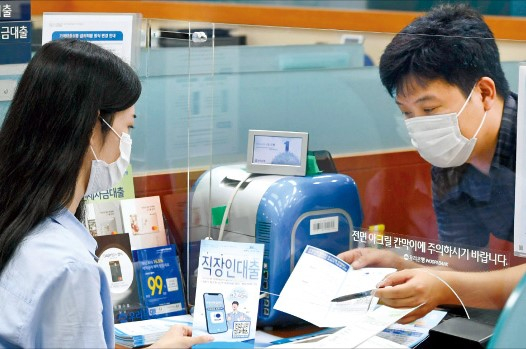S.Korean banks' household, company loans near $1.8 trn
By Jan 15, 2021 (Gmt+09:00)
LG Chem to sell water filter business to Glenwood PE for $692 million


Kyobo Life poised to buy Japan’s SBI Group-owned savings bank


KT&G eyes overseas M&A after rejecting activist fund's offer


StockX in merger talks with Naver’s online reseller Kream


Mirae Asset to be named Korea Post’s core real estate fund operator



South Korean households and companies have taken out fresh loans worth 208 trillion won ($189 billion) from banks last year, pushing the outstanding debt balance and the annual debt increase rate to record highs.
Banks’ outstanding balance for household and company loans stood at 1,965.2 trillion won ($1.8 trillion) at the end of 2020, up 207.9 trillion won from the previous year. It marked the largest year-on-year increase since 2004 and double the increase from 2019.
Households took out loans for mortgages and to invest in stocks, while companies borrowed money to cover losses that stemmed from weakened business activity due to the COVID-19 crisis, the Bank of Korea said in a report issued on Jan. 14.
Companies' borrowings from banks also jumped to 976.4 trillion won, up 107.4 trillion won from the previous year. The increase rate stood at 12.4%, more than double that of 5.4% in 2019. Independent business owners' loans surged to a record high 386 trillion won, as they scrambled to cover operating costs.
Household and company debt, combined with borrowings from non-bank financial institutions such as insurance companies, credit card companies and brokerage firms, has topped 4,000 trillion won, double the country's gross domestic product.

RISING REAL ESTATE PRICES, IPO FEVER DRIVES DEBT
Increasing household debt is owing to massive loans taken out to purchase stocks and real estate. Last year, house prices surged, which hiked up mortgage loans, alongside the initial public offering hype, which prompted retail investors to borrow money to purchase IPO stocks. Last year, retail investors scooped up a net 47.5 trillion won ($43.2 billion) worth of shares.
“There was a great demand for loans to buy IPO stocks, while others increased debt to purchase real estate and for living expenses,” said a Bank of Korea official.
Meanwhile, the prolonged COVID-19 crisis further escalated debt for companies and independent business owners as they had to scrape together money to maintain operations while sales plunged.

Market experts are worried that the rising debt may hurt the Korean economy. The Bank for International Settlements (BIS) has said that a country's economic growth rate could slow if the household debt-to-GDP ratio exceeds 80%. Korea's household debt-to-GDP ratio exceeded 100% in the third quarter of last year.
There are also rising concerns over potential debt insolvency. The government has rolled out support measures to mitigate the effects of the COVID-19 pandemic, which has helped maintain a low default rate.
However, many companies and households may become insolvent once the stimulus measures come to an end, which could shake up the country's financial system and the GDP, according to Kim Sang-bong, professor of economics at Hansung University.
Write to Ik-hwan Kim at lovepen@hankyung.com
Danbee Lee edited this article.
-
 Household debtS.Korea's household debt ratio exceeds 100% for first time
Household debtS.Korea's household debt ratio exceeds 100% for first timeNov 24, 2020 (Gmt+09:00)
1 Min read -
 Public financeS. Korea's fiscal deficit tops $90 bn; public debt hits record high
Public financeS. Korea's fiscal deficit tops $90 bn; public debt hits record highNov 10, 2020 (Gmt+09:00)
1 Min read -
 Korean household credit risk nears record-high
Korean household credit risk nears record-highJul 16, 2020 (Gmt+09:00)
3 Min read -
 Record-high Q2 Korean household debt heats up property, stock markets
Record-high Q2 Korean household debt heats up property, stock marketsAug 21, 2020 (Gmt+09:00)
2 Min read


